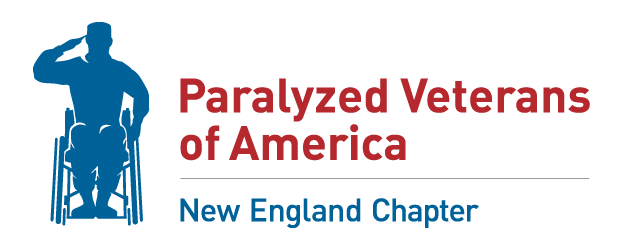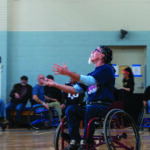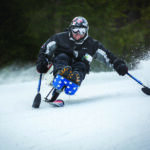Home // Sports & Activities // Athlete Spotlights // Cece Mazyck – U.S. Army Veteran
When Army veteran Centra “CeCe” Mazyck defines her success as a Paralympian and fierce competitor in the javelin, two things stand out: sunglasses and lip gloss.
It’s not that natural ability and years of hard work don’t factor into her achievements. But when the work is done and all that’s left is the competition, the retired Army sergeant first class says feeling good about herself – from sunglasses to styled hair to sparkling, glossy lips – is key. In fact, it is those elements that partially drew Mazyck to the Army in the first place.
“Out of high school, I went to fashion college because I wanted to become a fashion stylist,” says Mazyck, 39, a 2012 Paralympian and Paralyzed Veterans of America member. “One year in, I figured out I needed more education to do what I wanted to do, so I joined the Army Reserves in 1995.”
Initially, I was just there for school, but over time, I came to love the Army and the mission.
Eventually joining the 82nd Airborne Division at Ft. Bragg, N.C., Mazyck was making a routine jump on Nov. 26, 2003, when she was hit by a gust of wind as she exited the plane. The wind caused her parachute to collide with a fellow jumper’s, and while Mazyck used her training to separate the parachutes, it didn’t work, at least until the very end. As the two jumpers were about to land, the parachutes broke loose, leaving Mazyck no time for a proper landing.
A routine jump. A tragic impact.
“I landed with my feet and knees totally straight, so you can imagine the kind of impact that had,” Mazyck says. “I fell down and burst my L1 and L2 vertebrae; I was paralyzed on impact, and doctors told me I would never walk again.”
At that point, all Mazyck could think about was her then-infant son, Tristen, and how the doctor’s diagnosis would impact her role as a single mom. But while undergoing rehab in Fayetteville, N.C., Mazyck thought only of Tristen as she made a decision to fight.
“I remember wheeling past the therapy room and seeing those two silver metal bars where you can balance yourself and walk,” Mazyck said.
Even though I had no movement in my legs, my brain told me I could do it.
Therapists gave her the chance, and sure enough, Mazyck showed enough movement to convince staff to transport her to the spinal cord injury unit in Augusta, Ga., where she underwent therapy for four months. It was in Augusta that a Veterans Administration (VA) recreational therapist told her about the National Veterans Wheelchair Games – co-presented by the VA and Paralyzed Veterans of America – and other opportunities in adaptive sports.
When her therapy was complete, Mazyck opted to take a year or so living at home with her mom to adjust to her new way of life. As everyday tasks like driving and taking care of her son became more natural, her desire to be more independent also grew. Mazyck knew it was time to move out, even doing so much as driving to Orlando by herself to take her son to Disneyworld.
“I took my son to Disneyworld by myself because I realized that while the injury had happened to me, it didn’t have to stop me,” she says. “I decided to take it and ride with it because I didn’t want anyone raising my son but me.”
Camaraderie and spirit of the Paralympic Games
Armed with independence, Mazyck attended her first National Veterans Wheelchair Games in Minnesota in 2005, and instantly fell for the camaraderie and competitive spirit of the Games. “For me, it was like I was at the Paralympics already,” she says. “I didn’t even know anything about the Paralympics at the time, but I was ready to compete.”
Mazyck was invited to several adaptive sports training camps, trying nearly every sport, from basketball to track and field to swimming. Coaches noticed she had natural ability, but one piece of advice from fellow Army veteran and Paralympian John Register stuck with her and has become her mantra to this day: “You can be a trick of all trades but a master of none.”
“I couldn’t believe it when he said it, because out of all of that I didn’t know what I would do,” Mazyck says. “But that’s when I started focusing on javelin and shot put.”
Mazyck continued training, but sports took a backseat for a while as she attended the University of South Carolina, determined to complete her degree in Sociology. “I knew that if I quit school, I wasn’t going to go back,” she says. “I graduated in 2010, and that’s when I focused on the Paralympics 110 percent.”
Mazyck zeroed in on the javelin, pouring her time into bench presses, back exercises and practice in hopes of meeting the standards for the 2012 Paralympic Games in London. The hard work paid off: Mazyck competed in the Paralympic Trials in Indiana in 2011 with her best score ever – 20.64 meters, which qualified her for the U.S. team. “That was my breakthrough point where I said, ‘Now I’m in the game,’” she says.
While not medaling in the 57 Class for javelin at the 2012 Paralympics in London, Mazyck went on to compete at the World Championships in France, where she earned a bronze medal.
When one goal doesn’t work out, you set new ones to become a better person in life and society.
Determined to keep moving forward
Mazyck hasn’t taken her eyes off her goal of medaling at the Paralympics, but that goal will have to wait beyond the 2016 Games in Rio, as Mazyck is currently recovering from rotator cuff surgery. She also must find a different event, as the javelin is no longer offered at the Paralympics in the 57 Class, she says.
“I had the surgery because I’m not done being an athlete yet,” Mazyck says. “I don’t know if that involves switching to a Winter Olympic sport or trying something different in the Summer Paralympics, but I need to get my shoulder fixed so I can set new goals.”
Still, Mazyck hasn’t lost sight of her greatest goal, one that she medals in every day – raising son Tristen, now 13, who is in a prestigious leadership program at school and plays the cello.
“I can’t take this legacy with me; I want to pass it on to my son to let him know that if your mom can do it with a broken back and a wheelchair, he can do it.”



